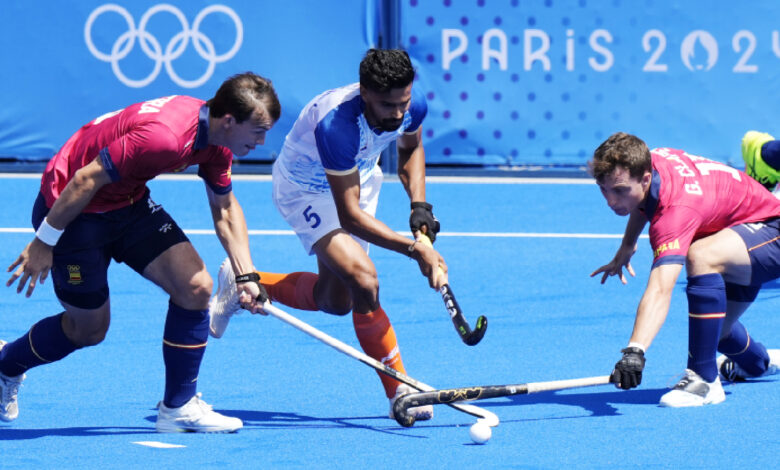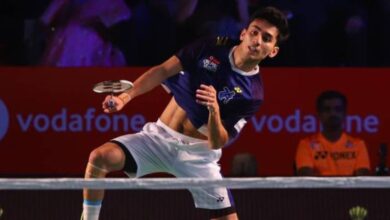Why Indian hockey star Abhishek is disappointed with Paris Olympic showing: ‘It’s a bronze when gold was in reach’ | Hockey News

Receptions held the prime miner and president of the country, felicitations in their hometowns and massive celebrations, the welcome back to the Indian hockey team after winning horic bronze in Paris – the first time in 52 years that the team has won back-to-back medals at the Olympics – has been grand.Yet many in the playing group, especially those whose rise has coincided with the re-rise of Indian hockey, are not too keen to sit on their laurels. 25-year-old forward Abhishek is a case in point.
“This is big for us, it’s an Olympic medal, but it’s still a bronze when gold was in reach,” Abhishek told The Indian Express after returning from Paris. “In my view, there are areas in which we all can improve. We need more consency, were playing well on one day, making too many makes on another. We need to start scoring early, not just attacking well when we concede. There are a lot of smaller things.”
Abhishek is among the younger crop of players in this team, alongside the likes of Hardik Singh and Raj Kumar Pal, who have risen through the ranks in the past few years as India have notched up successes. His Paris bronze adds to a collection of Commonwealth silver and Asian Games gold during his short career.
His critical appraisal of the team’s results – often a sign of developing the winning edge – clearly indicates how the standards have been raised among India’s next generation of hockey stars under the seemingly positive philosophy of coach Craig Fulton.
He is equally harsh on himself. “I don’t think I had a good tournament,” the Haryana-based forward said. “I gave my best, everything, but I was not at 100% performance. I scored two goals, important goals, but really, I should have scored more.”
Goals from open play were an issue throughout the team. 10 out of the 15 goals came from set pieces, each from skipper Harmanpreet Singh.
The two goals Abhishek speaks of – the first in the solid performance against Belgium, which, despite losing, is seen as the match in which India turned their tournament around; the second being the opener in their blowaway win against Australia – were similar, hit on a marauding half-turn after he received the ball with his back to goal.
This was a result of a concerted effort from Fulton, during India’s pre-Games preparation, to improve outcomes in the D with a focus among the forwards to develop an edge with their back to goal.
“I have been practicing this (finishing on the half turn) a lot. Some myself, some with the coach,” Abhishek said. “At this level, international defenders give you no space. The D is almost always crowded when you’re in attack, so making the space for yourself is the most important thing. That’s the focus from the coach.”
Will to improve
Some may remember the now well-reported story of how a life-threatening accident – in which he got his hand caught in a barbed-wire fence, splintering a nerve and nearly losing a fatal dose of blood – turned around Abhishek’s life. But few would know his immediate reaction.
“He woke up after the accident, and the first thing he asked his mother was: ‘Please don’t stop me from playing hockey now’,” Shamsher Singh, Abhishek’s childhood coach-cum-Hindi teacher, recalls.
Abhishek got his start at the CZR Sr. Secondary School in Sonipat in his formative years, under the tutelage of an unconventional coach in Singh, who remembers being particularly harsh on him after recognising his talents.
“When he was younger, he was disciplined and talented, but he didn’t always understand that he must make the most of it,” Singh, who Abhishek still affectionately refers to as ‘Masterji’, says. “I’ve coached players at his level, sometimes even better, that did not get chances because of their circumstances. The special thing about him is that once he got the chance, there was no looking back.”
That may explain, according to Singh, why Abhishek is self-critical. He constantly thinks he can improve. “I remember seeing him sulk in the first few matches on TV. I messaged him asking what was wrong and he replied saying he was disappointed he had not yet scored any goals. I tried to explain to him that he is contributing in other ways, playing well with the team, but he was not having it. He accepts nothing less than what he expects from himself,” the coach says.
Part of what makes him one of the more dangerous forwards in the team is his versatility. This is why Singh, having witnessed his sporting upbringing from start to finish. calls him a “coach’s dream”.
“Today’s hockey is about scoring goals with touches and rebounds and setpieces, crowding the circle. That’s not how Abhishek used to play,” he says. “In his younger days, he was a great dribbler (drawing comparisons with Pakan great Shahbaz Ahmed) and got past people. He could dodge and had ball control. Unlike other kids, he never panicked in the D. Now, he has adapted his style. He is the perfect mix of the old and new generation.”
So, it comes as no surprise that Fulton wished to build his attack around Abhishek’s skills, along with the dragflicking expertise of Harmanpreet and the crucial midfield interventions of Manpreet Singh. He, or his successor, would presumably also like for the upcoming generation of players to share traits of Abhishek’s mentality.
“When I came home (in Sonipat), it hit me that this achievement was big. Family and friends gathered to welcome me, celebrate. I met Masterji, he was also a bit emotional,” Abhishek says. “But I need to get better if I want to do better for the team.”




